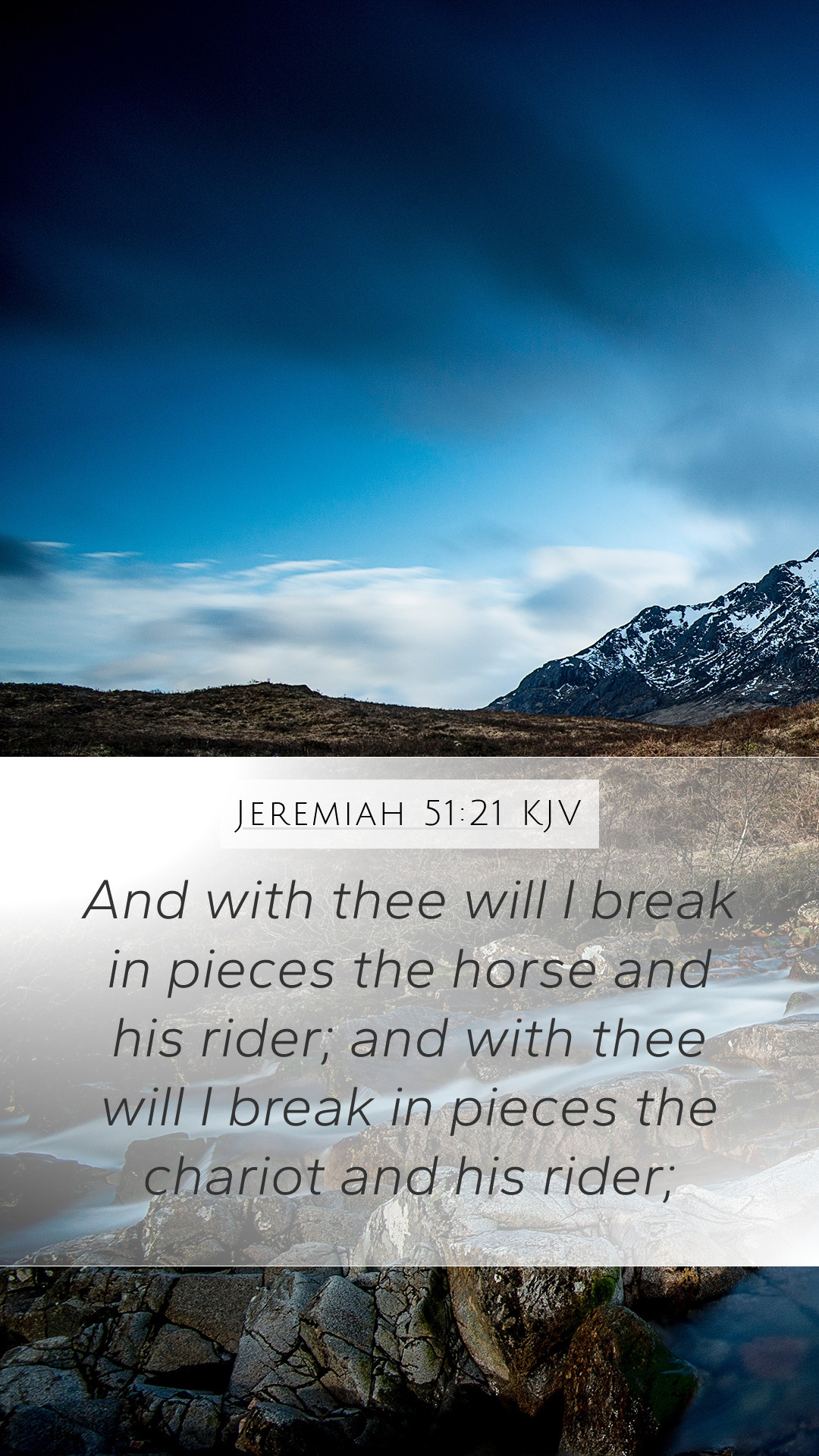Understanding Jeremiah 51:21
Jeremiah 51:21 states: "And with thee will I break in pieces the shepherd and his flock; and with thee will I break in pieces the husbandman and his yoke of oxen; and with thee will I break in pieces captains and rulers." This verse appears in the broader context of God's judgment upon Babylon, illustrating His power and the extent of His plans against the nation.
Bible Verse Meanings
The meaning of Jeremiah 51:21 emphasizes divine intervention and the sovereignty of God in executing His will over nations and leaders. Here, God declares His intention to dismantle not just the nation of Babylon, but all structures of power that oppose Him.
Bible Verse Interpretations
- Matthew Henry: Henry highlights that this verse illustrates the comprehensive nature of God’s judgment, affecting all levels from leaders to common citizens. He interprets the breaking in pieces as a metaphor for the total destruction that God will bring upon Babylon.
- Albert Barnes: Barnes points out that the mention of shepherds and oxen signifies the removal of leadership and the loss of livelihood, indicating a societal collapse that stems from divine wrath. He emphasizes the symbolic nature of the references to shepherds, relating them to rulers and leaders who mislead the people.
- Adam Clarke: Clarke interprets this verse as a vivid demonstration of God’s omnipotence. He connects the breaking of the yoke of oxen to the breaking of the bonds of oppression, signifying freedom from servitude through God’s power while also condemning the leaders who have oppressed the people.
Bible Verse Understanding
This passage can be understood within a broader narrative of the downfall of Babylon. The portrayal of breaking pieces serves not just as a warning, but it also indicates the ultimate authority of God in matters of justice and retribution. It underscores the themes of divine justice and societal accountability.
Bible Verse Explanations
The explanation of Jeremiah 51:21 extends into the idea that God's judgment often manifests in various forms, impacting not only the leaders but also their followers. It shows that when a nation turns from God, the consequences can lead to total disarray among all who are connected to its governance and societal structures.
In-Depth Bible Verse Analysis
In analyzing this verse, it helps to reflect on the historical context of Babylon during Jeremiah’s time. The empire stood as a representation of powerful opposition to God and His people, and thus, this declaration represents a prophetic warning that ultimately culminates in the historical fall of Babylon.
Bible Study Insights
When studying this verse, it is crucial to consider how it relates to contemporary issues of power and leadership. The destruction of corrupt systems can echo throughout time, signaling us to remain vigilant against practices contrary to God’s will.
Related Bible Cross References
- Isaiah 13:2-3: A prophetic warning against Babylon indicating divine hostility toward oppressors.
- Revelation 18:2: The fall of Babylon is announced with similar imagery of destruction.
- Ezekiel 34:11-16: A contrast of God as a faithful shepherd versus unfaithful leaders.
Applying Bible Verses to Daily Life
Understanding the implications of Jeremiah 51:21 encourages believers to reflect on the nature of their leaders and the responsibilities associated with leadership. It calls for a deeper examination of accountability in positions of power and affirms the belief that God holds all leaders to account.
Conclusion
Incorporating the insights from various commentaries provides a layered understanding of Jeremiah 51:21, drawing attention to God’s omnipotent authority over nations. This verse serves as a powerful reminder of divine justice and encourages believers to uphold righteousness in their own lives.


